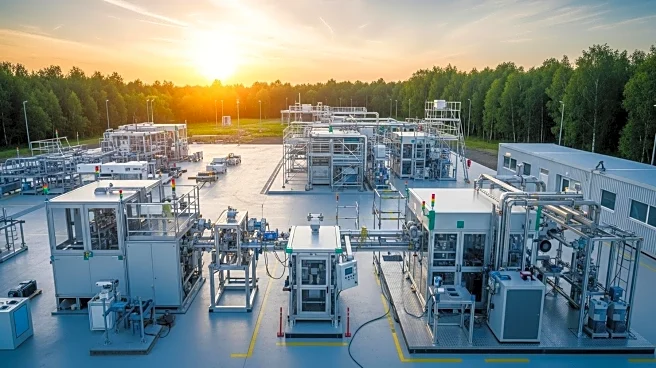What's Happening?
AstraZeneca has initiated the construction of a new manufacturing facility in Virginia, marking the first phase of its $50 billion investment in U.S. operations. The facility, located near Charlottesville in Albemarle County, is part of a broader strategy to comply with President Trump's directive for pharmaceuticals used in the U.S. to be manufactured domestically. The Virginia plant, costing approximately $4.5 billion, is expected to create around 3,600 jobs, both direct and indirect, and will employ 600 full-time workers upon completion. The facility will produce a range of medicines, including oral GLP-1 candidates for diabetes and weight loss, baxdrostat for high blood pressure, and oral PCSK9 drugs for cholesterol-lowering. The investment has increased by $500 million to accommodate additional production capabilities, including antibody-drug conjugates for cancer treatment.
Why It's Important?
This development is significant as it aligns with the Trump administration's focus on onshoring drug manufacturing to enhance supply chain security and improve access to medications for Americans. AstraZeneca's investment is expected to bolster the U.S. pharmaceutical industry, potentially increasing domestic production and reducing reliance on imports. The creation of thousands of jobs will contribute to economic growth in the region, while the facility's focus on innovative medicines could advance healthcare outcomes. The move also reflects AstraZeneca's strategic shift towards the U.S. market, aiming to grow its annual revenues significantly by 2030.
What's Next?
The construction of the Virginia facility is expected to be completed in approximately five years, with AstraZeneca planning to employ a diverse workforce of engineers, scientists, and process facilitators. The company may continue to expand its U.S. operations, potentially influencing other pharmaceutical companies to follow suit in response to tariff threats on imports. The Trump administration's policies could lead to further investments in domestic manufacturing, strengthening the U.S. pharmaceutical sector and ensuring greater control over drug supply chains.
Beyond the Headlines
AstraZeneca's decision to invest heavily in the U.S. comes after withdrawing from a smaller investment in the UK due to pricing challenges with the NHS. This shift highlights the competitive landscape of global pharmaceutical markets and the impact of national policies on corporate strategies. The company's listing on the New York Stock Exchange and the launch of a Direct-To-Consumer sales channel in the U.S. further emphasize its commitment to expanding its presence in the world's largest pharma market.











